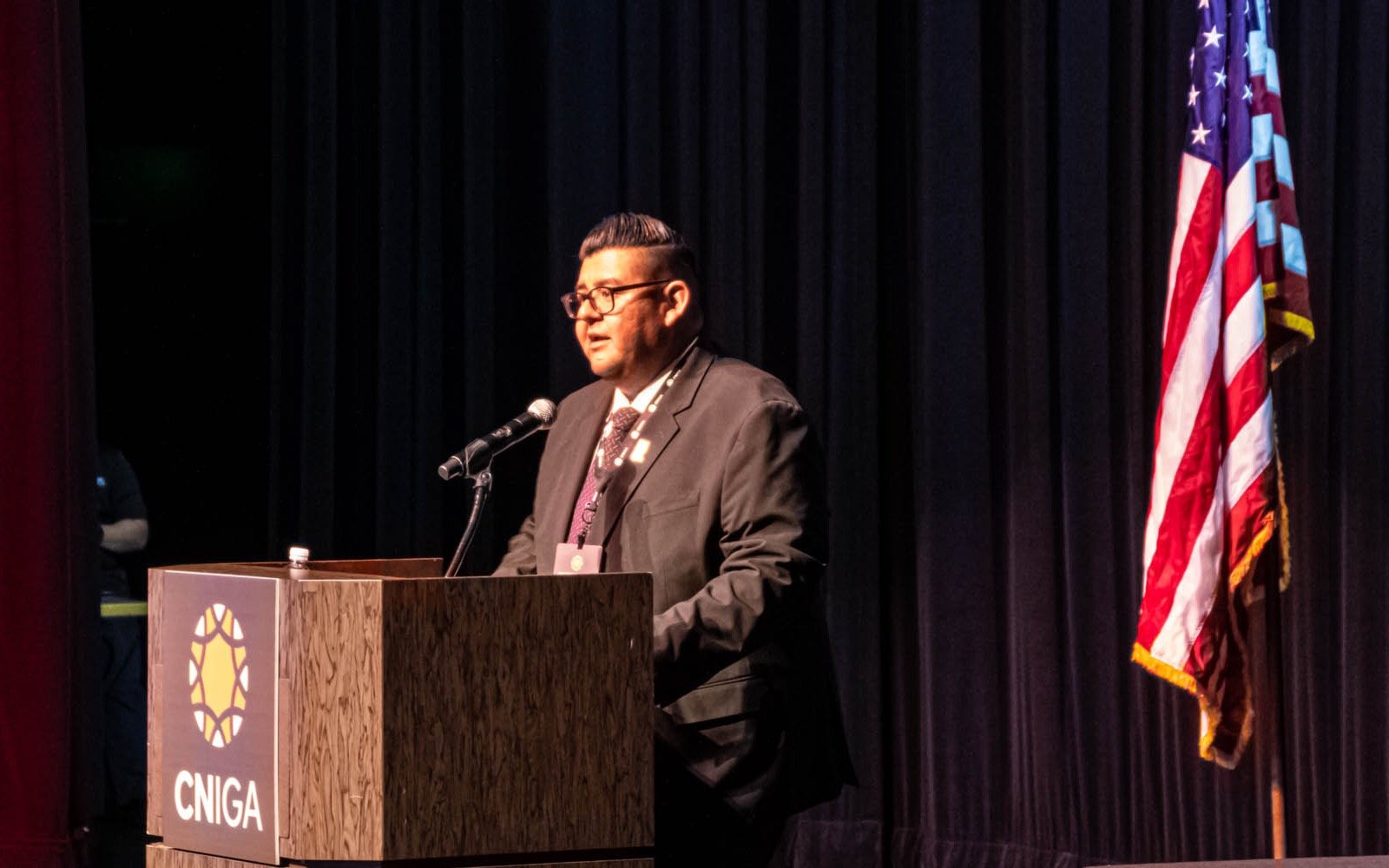California Tribal Gaming Leader Says Feds Right to Reject Gaming Compacts

California Tribal Gaming Leader Says Feds Right to Reject Gaming Compacts
The leader of California’s tribal gaming association says he agrees with the US Department of the Interior. That s regarding its decisions last week to reject gaming compact amendments submitted by two of its members and the state.
 California Nations Indian Gaming Association Chairman James Siva speaks at the 2020 conference. On Tuesday, Siva said he agreed with the recent decisions by the US Department of the Interior to reject gaming compact amendments because of language regarding state requirements for matters not involving gaming. (Image: CNIGA/Facebook)
California Nations Indian Gaming Association Chairman James Siva speaks at the 2020 conference. On Tuesday, Siva said he agreed with the recent decisions by the US Department of the Interior to reject gaming compact amendments because of language regarding state requirements for matters not involving gaming. (Image: CNIGA/Facebook)California Nations Indian Gaming Association (CNIGA) Chairman James Siva said in a statement Tuesday that the compacts for the Middletown Rancheria of Pomo Indians and the Santa Rosa Indian Community of the Santa Rosa Rancheria (also known as the ) yielded too much power to the state.
Simply put, the state should not put any tribe in the position of having to choose between the self-reliance offered through gaming and surrendering its sovereignty in matters not directly related to and necessary for the regulation, licensing and actual operation of class III gaming activities,” said Siva, who also serves as the vice chair for the Morongo Band of Mission Indians.
All Class III gaming compacts reached between tribes and state governments must be reviewed and approved by the Department of the Interior before they can be enacted. That s under the Indian Gaming Regulatory Act (IGRA). The federal government has 45 days to render its decision upon receipt of the compacts.
Newland Cites Ongoing LawsuitLast week’s rejections by the Interior Department were the second it issued on amended compacts between those two tribes and Gov. Gavin Newsom’s office within the past year. Newsom earlier this week for what he deemed was an arbitrary decision.
Rejection letters sent Friday by Assistant Secretary of the Interior for Indian Affairs Bryan Newland outlined the issues. The concerns the federal government had with the amendments included a requirement for binding arbitration to resolve disputes. Hyland said that could lead to the compact being amended without the federal government getting a chance for a review.
Newland said the federal government rejected the amended compacts because of their language. One clause required the tribal casinos to abide by state court orders for child or spousal support against any non-tribal member casino employee. The federal government said that was an imposition and took jurisdiction away from the tribes.
Newland also noted a March 2021 federal court ruling. That decision sided with five California tribes that objected to attempts by the Newsom Administration to make them comply with state laws. US District Court Judge Anthony Ishii ruled the governor negotiated in “bad faith” by making demands that did not pertain to gaming.
Jason Ramos, the vice-chairman for the Blue Lake Rancheria, said he was surprised to see Newsom’s statement.
“Did he even read (Newland’s letters)? The Assistant Secretary explained in detail why the rejected compacts violated the IGRA and were not consistent with Judge Ishii’s decision in our case,” Ramos said. “The Assistant Secretary’s letters were well-reasoned, anything but arbitrary, and consistent with Congress’ intent to protect tribes from the same jurisdictional grab that the State is attempting here through the compacting process.”
Blue Lake Rancheria is one of the tribes involved in the case, along with the Chicken Ranch Rancheria of Me-Wuk Indians, Chemehuevi Indian Tribe, Hopland Band of Pomo Indians, and the Robinson Rancheria. The case is currently before the US Ninth Circuit Court of Appeals.
Siva to Newsom: Come Back to the TableNewsom said that the state would continue to work with the tribes “to rectify this decision and avoid its negative impacts.”
Siva suggested that Newsom should not act hastily. Recently, California agreed to extend existing compacts with 27 tribes until Dec. 31, 2023. The extension covered the existing compacts for the Middletown Rancheria and the Santa Rosa Rancheria.
“Gov. Newsom should come to the negotiating table prepared to enter into new agreements that are confined to what IGRA permits,” Siva said. “If he were to do that, new IGRA-compliant compacts could be in place well before the current agreements expire, and the chairs of the two tribes whose compacts were disapproved would not have to worry about any threats to their future prosperity.”
In the federal case, the five tribes have asked Ishii to appoint an arbitrator who would pick from the compact proposals the state and the tribes have submitted. Under the proposal, the arbitrator would decide which proposal should be submitted for federal approval. If the arbitrator picked the tribe’s proposal and the state refused to consider it, then the tribes could then proceed straight to the Interior Department for its review.
“We applaud the position the Assistant Secretary has taken. It upholds tribal sovereignty, and in the long run, it will promote more, not less, economic development on the reservations by eliminating the additional layer of state bureaucratic red tape that denies the tribes the flexibility to manage their casinos, create more jobs and make more money,” Robinson Rancheria Chairman Beniakem Crowwell said.



 Svenska Spel Sport & Casino
Svenska Spel Sport & Casino